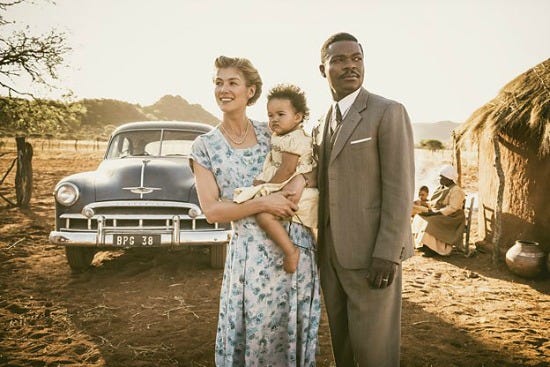A United Kingdom

“A United Kingdom” is less a story of romantic love than love of country. Patriotism seems out of favor these days, or at least a little frightening in some of its recent incarnations. But this film, based on the real marriage between an African king and an English woman, shows us the noblest side of devotion to one’s people.
David Oyelowo gives a powerful, emotionally layered performance as Seretse Khama, the crown prince of Botswana, known in 1947 as Bechuanaland, a British protectorate. His father died when he was a small child, so his uncle Tshekedi (Vusi Kunene) has ruled as regent for the past two decades.
He’s all set to return home after completing his education studying the law in England, and take his rightful place on the throne. But then he falls for Ruth Williams (Rosamund Pike), a humble clerk, and they determine to marry. This sets off an international brouhaha, as various forces react harshly to the wedding of a white woman and a black man.
Most notably, the South Africans are in the process of instituting apartheid, i.e. total separation of the races with the whites as the unquestioned masters. It wouldn’t do to have an interracial couple ruling the fragile nation on their northern border, and the British are too badly in need of their gold and uranium to risk upsetting the balance.
Director Amma Asante (“Belle”) and screenwriter Guy Hibbert (“Eye in the Sky”) rush us somewhat through the courtship and wedding. But that’s fine, because the film really kicks into high gear when they return to Africa. They’d counted on some resistance and even hatred, but are surprised when seemingly every party is moving against them.
A pair of British bureaucrats, played by Jack Davenport and Tom Felton in full pomp-and-snobbery mode, frustrate them at every turn while presenting a genteel face and even the façade of friendship. Meanwhile, Ruth must deal with the other women of the royal family, notably Seretse’s sister Naledi (Terry Pheto), who are offended that this lily-white woman has presented herself for the role as mother to their country.
The story follows the historical record, with some omissions and condensing of timelines. We move between the houses of British Parliament and the more democratically pure kgotlas of Bechuanaland, as men gather in the open air to hear the appeals of their leaders and vote their will.
Ultimately this is Seretse Khama’s story, a great man whose name is probably unknown to many on these shores. He was an early voice for equality between the races and independence for burgeoning countries.
Oyelowo also shows him to be a shrewd man who knew he had little real power other than what his tongue and example could bring. He and his wife are separated for long stretches as a ruse brings him to London so an exile can be imposed, then teased at being rescinded, just to keep the South Africans pacified.
“A United Kingdom” perhaps tugs a little too hard at the heartstrings at times — Patrick Doyle’s syrupy musical score lends no favors. But it has the majesty of a true story told with conviction by a fine cast.



